Assessment of Academic Integrity: Importance, Ethics & Game Reflection
VerifiedAdded on 2023/06/15
|8
|2598
|234
Report
AI Summary
This report analyzes the importance of academic integrity in higher education, emphasizing its role in fostering ethical behavior, ensuring work originality, and building trust between teachers and students. It evaluates the implications of academic misconduct, such as plagiarism, which can lead to negative academic records, damaged relationships, and hindered career growth. The report also includes a reflection on producing a game, highlighting the skills developed, such as decision-making, communication, teamwork, and creativity. The reflection details challenges faced during game development, including time management and generating creative ideas, and how these challenges were overcome through research, collaboration, and improved time management techniques. Ultimately, the report concludes that upholding academic integrity is crucial for both academic and professional success.
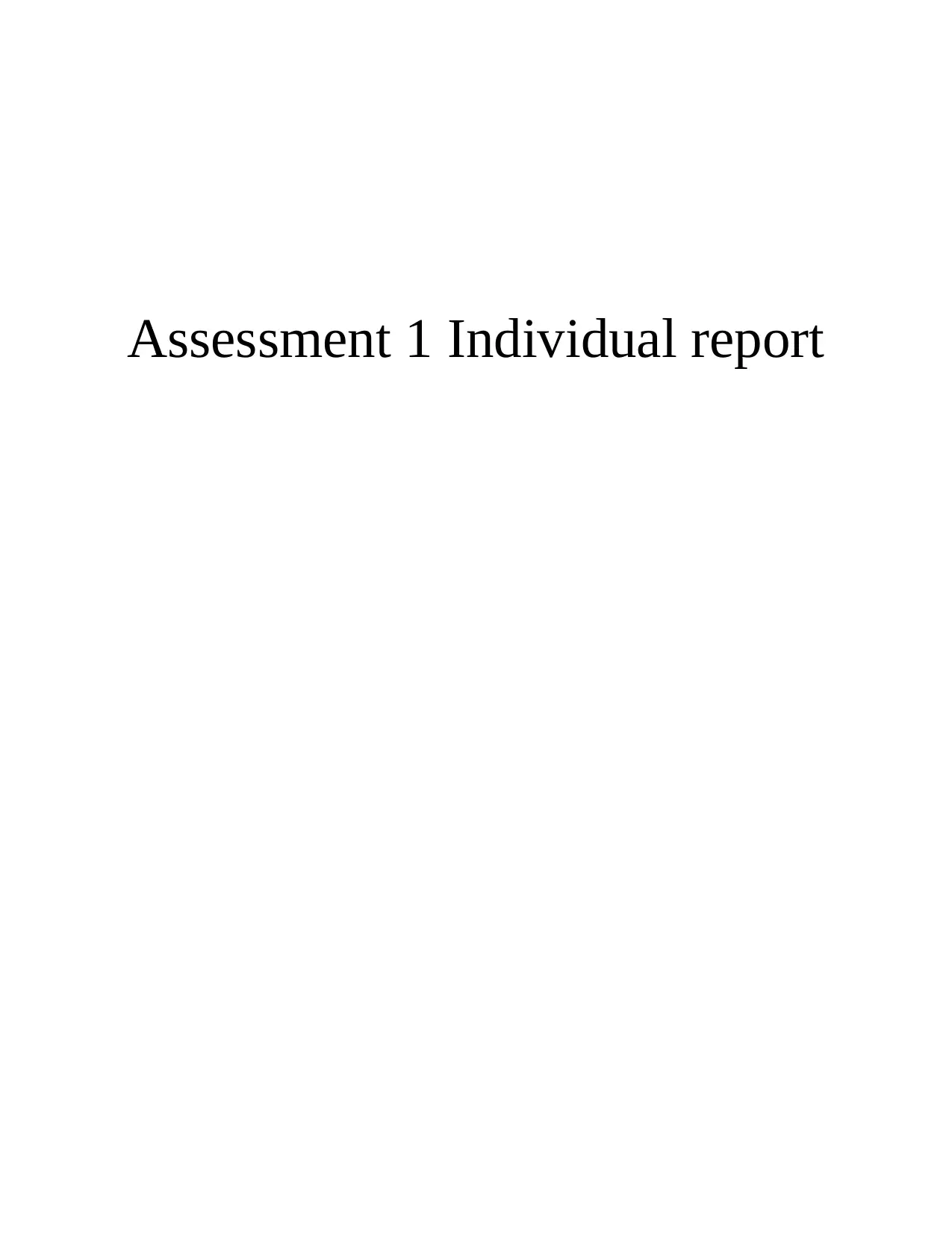
Assessment 1 Individual report
Paraphrase This Document
Need a fresh take? Get an instant paraphrase of this document with our AI Paraphraser
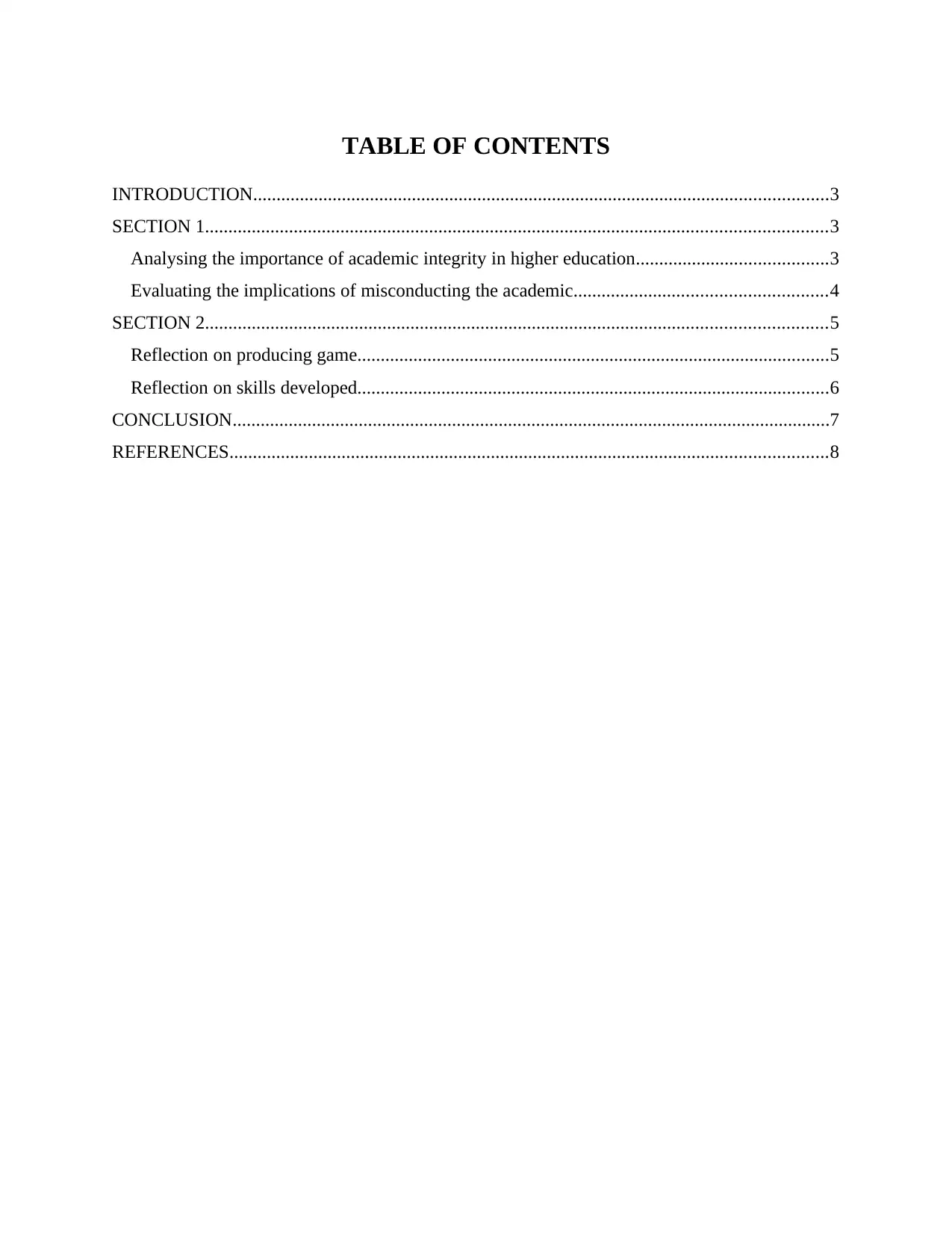
TABLE OF CONTENTS
INTRODUCTION...........................................................................................................................3
SECTION 1.....................................................................................................................................3
Analysing the importance of academic integrity in higher education.........................................3
Evaluating the implications of misconducting the academic......................................................4
SECTION 2.....................................................................................................................................5
Reflection on producing game.....................................................................................................5
Reflection on skills developed.....................................................................................................6
CONCLUSION................................................................................................................................7
REFERENCES................................................................................................................................8
INTRODUCTION...........................................................................................................................3
SECTION 1.....................................................................................................................................3
Analysing the importance of academic integrity in higher education.........................................3
Evaluating the implications of misconducting the academic......................................................4
SECTION 2.....................................................................................................................................5
Reflection on producing game.....................................................................................................5
Reflection on skills developed.....................................................................................................6
CONCLUSION................................................................................................................................7
REFERENCES................................................................................................................................8
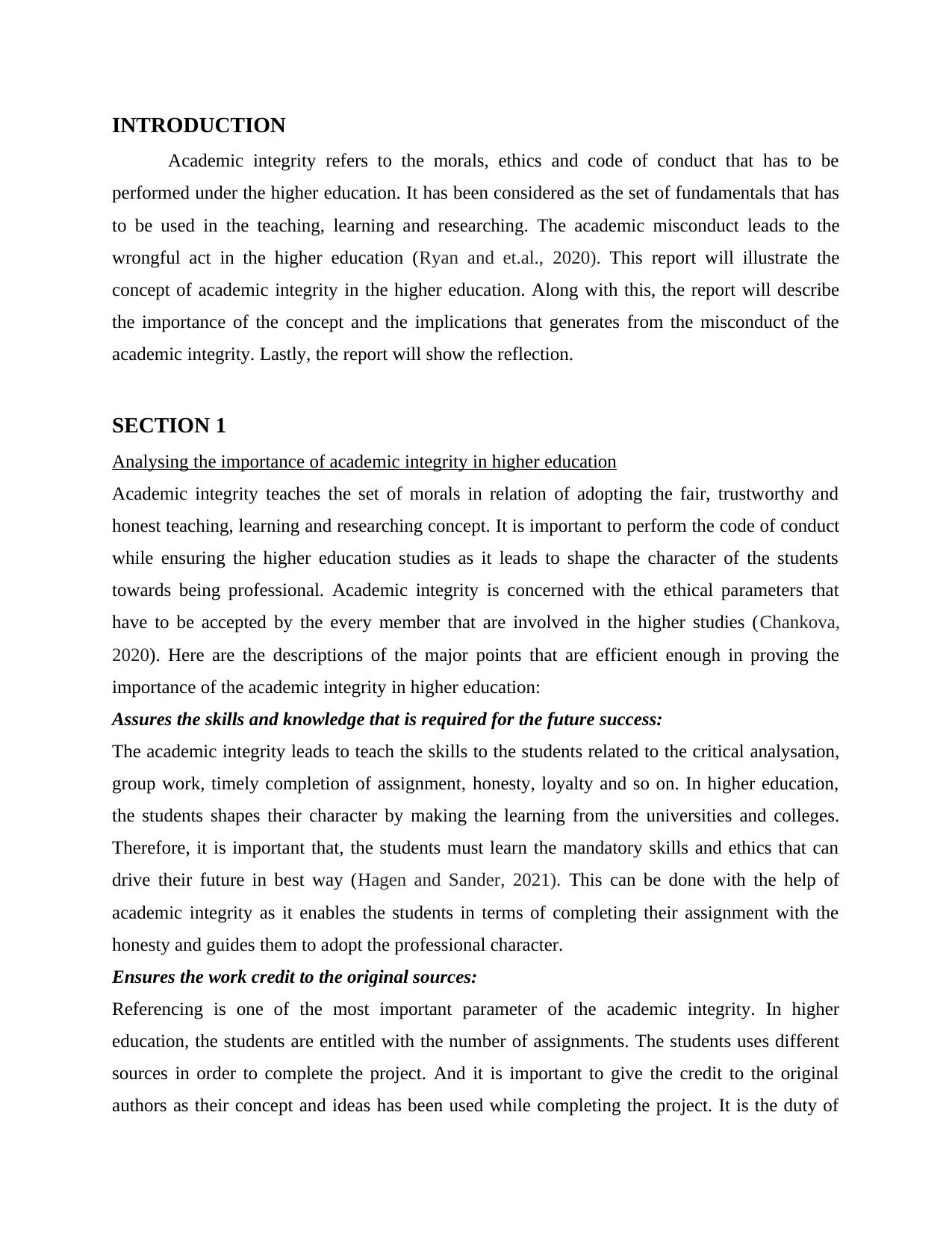
INTRODUCTION
Academic integrity refers to the morals, ethics and code of conduct that has to be
performed under the higher education. It has been considered as the set of fundamentals that has
to be used in the teaching, learning and researching. The academic misconduct leads to the
wrongful act in the higher education (Ryan and et.al., 2020). This report will illustrate the
concept of academic integrity in the higher education. Along with this, the report will describe
the importance of the concept and the implications that generates from the misconduct of the
academic integrity. Lastly, the report will show the reflection.
SECTION 1
Analysing the importance of academic integrity in higher education
Academic integrity teaches the set of morals in relation of adopting the fair, trustworthy and
honest teaching, learning and researching concept. It is important to perform the code of conduct
while ensuring the higher education studies as it leads to shape the character of the students
towards being professional. Academic integrity is concerned with the ethical parameters that
have to be accepted by the every member that are involved in the higher studies (Chankova,
2020). Here are the descriptions of the major points that are efficient enough in proving the
importance of the academic integrity in higher education:
Assures the skills and knowledge that is required for the future success:
The academic integrity leads to teach the skills to the students related to the critical analysation,
group work, timely completion of assignment, honesty, loyalty and so on. In higher education,
the students shapes their character by making the learning from the universities and colleges.
Therefore, it is important that, the students must learn the mandatory skills and ethics that can
drive their future in best way (Hagen and Sander, 2021). This can be done with the help of
academic integrity as it enables the students in terms of completing their assignment with the
honesty and guides them to adopt the professional character.
Ensures the work credit to the original sources:
Referencing is one of the most important parameter of the academic integrity. In higher
education, the students are entitled with the number of assignments. The students uses different
sources in order to complete the project. And it is important to give the credit to the original
authors as their concept and ideas has been used while completing the project. It is the duty of
Academic integrity refers to the morals, ethics and code of conduct that has to be
performed under the higher education. It has been considered as the set of fundamentals that has
to be used in the teaching, learning and researching. The academic misconduct leads to the
wrongful act in the higher education (Ryan and et.al., 2020). This report will illustrate the
concept of academic integrity in the higher education. Along with this, the report will describe
the importance of the concept and the implications that generates from the misconduct of the
academic integrity. Lastly, the report will show the reflection.
SECTION 1
Analysing the importance of academic integrity in higher education
Academic integrity teaches the set of morals in relation of adopting the fair, trustworthy and
honest teaching, learning and researching concept. It is important to perform the code of conduct
while ensuring the higher education studies as it leads to shape the character of the students
towards being professional. Academic integrity is concerned with the ethical parameters that
have to be accepted by the every member that are involved in the higher studies (Chankova,
2020). Here are the descriptions of the major points that are efficient enough in proving the
importance of the academic integrity in higher education:
Assures the skills and knowledge that is required for the future success:
The academic integrity leads to teach the skills to the students related to the critical analysation,
group work, timely completion of assignment, honesty, loyalty and so on. In higher education,
the students shapes their character by making the learning from the universities and colleges.
Therefore, it is important that, the students must learn the mandatory skills and ethics that can
drive their future in best way (Hagen and Sander, 2021). This can be done with the help of
academic integrity as it enables the students in terms of completing their assignment with the
honesty and guides them to adopt the professional character.
Ensures the work credit to the original sources:
Referencing is one of the most important parameter of the academic integrity. In higher
education, the students are entitled with the number of assignments. The students uses different
sources in order to complete the project. And it is important to give the credit to the original
authors as their concept and ideas has been used while completing the project. It is the duty of
⊘ This is a preview!⊘
Do you want full access?
Subscribe today to unlock all pages.

Trusted by 1+ million students worldwide
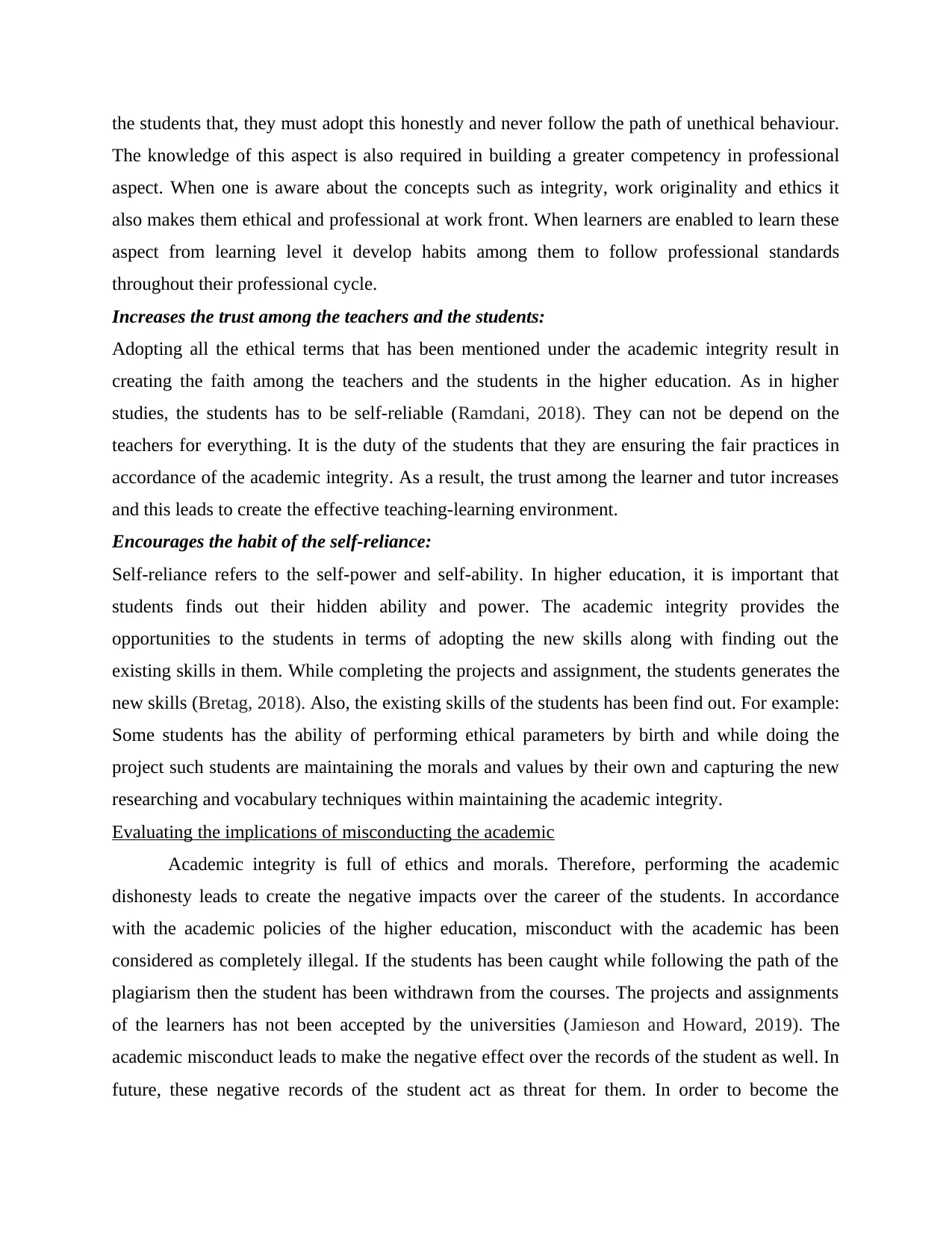
the students that, they must adopt this honestly and never follow the path of unethical behaviour.
The knowledge of this aspect is also required in building a greater competency in professional
aspect. When one is aware about the concepts such as integrity, work originality and ethics it
also makes them ethical and professional at work front. When learners are enabled to learn these
aspect from learning level it develop habits among them to follow professional standards
throughout their professional cycle.
Increases the trust among the teachers and the students:
Adopting all the ethical terms that has been mentioned under the academic integrity result in
creating the faith among the teachers and the students in the higher education. As in higher
studies, the students has to be self-reliable (Ramdani, 2018). They can not be depend on the
teachers for everything. It is the duty of the students that they are ensuring the fair practices in
accordance of the academic integrity. As a result, the trust among the learner and tutor increases
and this leads to create the effective teaching-learning environment.
Encourages the habit of the self-reliance:
Self-reliance refers to the self-power and self-ability. In higher education, it is important that
students finds out their hidden ability and power. The academic integrity provides the
opportunities to the students in terms of adopting the new skills along with finding out the
existing skills in them. While completing the projects and assignment, the students generates the
new skills (Bretag, 2018). Also, the existing skills of the students has been find out. For example:
Some students has the ability of performing ethical parameters by birth and while doing the
project such students are maintaining the morals and values by their own and capturing the new
researching and vocabulary techniques within maintaining the academic integrity.
Evaluating the implications of misconducting the academic
Academic integrity is full of ethics and morals. Therefore, performing the academic
dishonesty leads to create the negative impacts over the career of the students. In accordance
with the academic policies of the higher education, misconduct with the academic has been
considered as completely illegal. If the students has been caught while following the path of the
plagiarism then the student has been withdrawn from the courses. The projects and assignments
of the learners has not been accepted by the universities (Jamieson and Howard, 2019). The
academic misconduct leads to make the negative effect over the records of the student as well. In
future, these negative records of the student act as threat for them. In order to become the
The knowledge of this aspect is also required in building a greater competency in professional
aspect. When one is aware about the concepts such as integrity, work originality and ethics it
also makes them ethical and professional at work front. When learners are enabled to learn these
aspect from learning level it develop habits among them to follow professional standards
throughout their professional cycle.
Increases the trust among the teachers and the students:
Adopting all the ethical terms that has been mentioned under the academic integrity result in
creating the faith among the teachers and the students in the higher education. As in higher
studies, the students has to be self-reliable (Ramdani, 2018). They can not be depend on the
teachers for everything. It is the duty of the students that they are ensuring the fair practices in
accordance of the academic integrity. As a result, the trust among the learner and tutor increases
and this leads to create the effective teaching-learning environment.
Encourages the habit of the self-reliance:
Self-reliance refers to the self-power and self-ability. In higher education, it is important that
students finds out their hidden ability and power. The academic integrity provides the
opportunities to the students in terms of adopting the new skills along with finding out the
existing skills in them. While completing the projects and assignment, the students generates the
new skills (Bretag, 2018). Also, the existing skills of the students has been find out. For example:
Some students has the ability of performing ethical parameters by birth and while doing the
project such students are maintaining the morals and values by their own and capturing the new
researching and vocabulary techniques within maintaining the academic integrity.
Evaluating the implications of misconducting the academic
Academic integrity is full of ethics and morals. Therefore, performing the academic
dishonesty leads to create the negative impacts over the career of the students. In accordance
with the academic policies of the higher education, misconduct with the academic has been
considered as completely illegal. If the students has been caught while following the path of the
plagiarism then the student has been withdrawn from the courses. The projects and assignments
of the learners has not been accepted by the universities (Jamieson and Howard, 2019). The
academic misconduct leads to make the negative effect over the records of the student as well. In
future, these negative records of the student act as threat for them. In order to become the
Paraphrase This Document
Need a fresh take? Get an instant paraphrase of this document with our AI Paraphraser
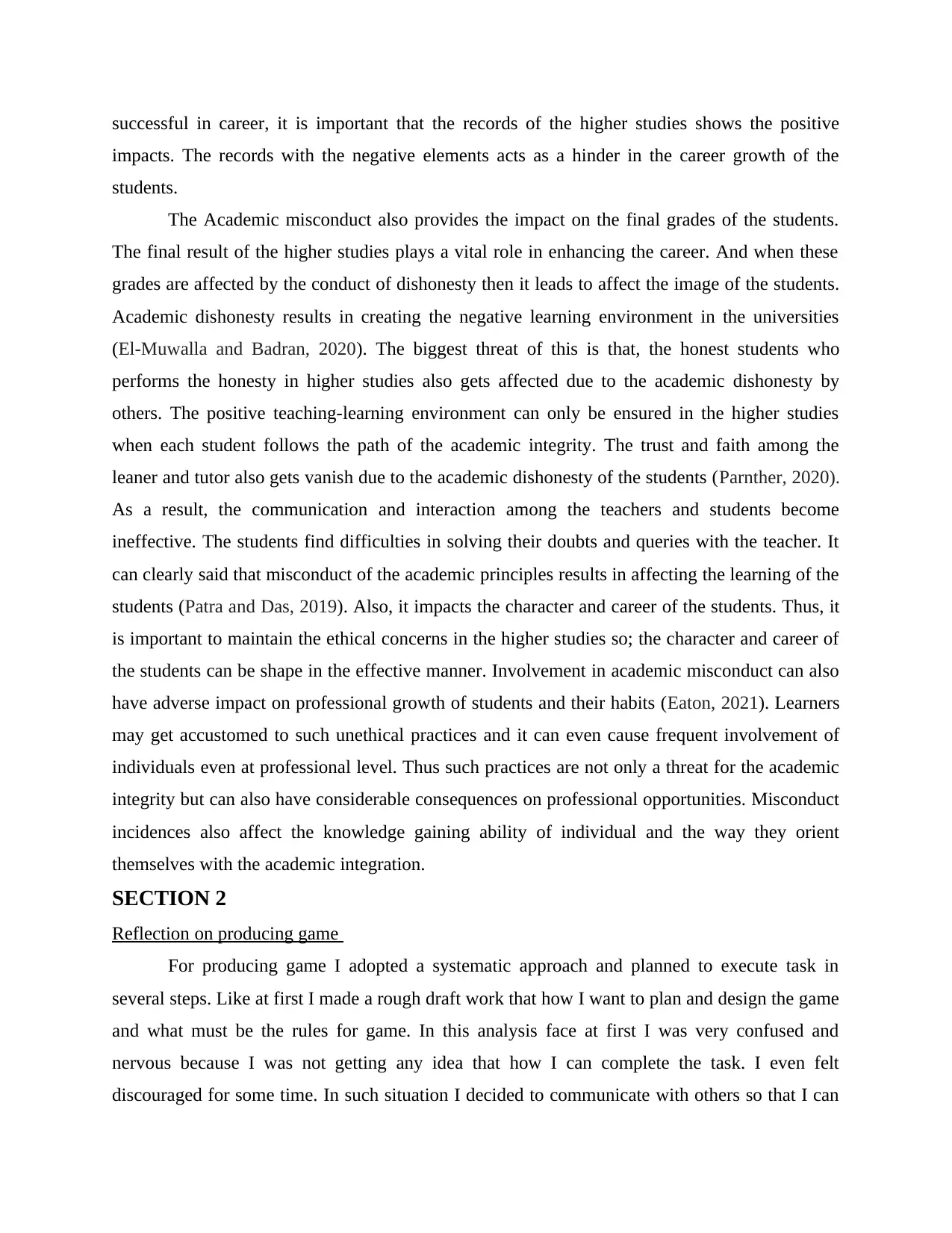
successful in career, it is important that the records of the higher studies shows the positive
impacts. The records with the negative elements acts as a hinder in the career growth of the
students.
The Academic misconduct also provides the impact on the final grades of the students.
The final result of the higher studies plays a vital role in enhancing the career. And when these
grades are affected by the conduct of dishonesty then it leads to affect the image of the students.
Academic dishonesty results in creating the negative learning environment in the universities
(El-Muwalla and Badran, 2020). The biggest threat of this is that, the honest students who
performs the honesty in higher studies also gets affected due to the academic dishonesty by
others. The positive teaching-learning environment can only be ensured in the higher studies
when each student follows the path of the academic integrity. The trust and faith among the
leaner and tutor also gets vanish due to the academic dishonesty of the students (Parnther, 2020).
As a result, the communication and interaction among the teachers and students become
ineffective. The students find difficulties in solving their doubts and queries with the teacher. It
can clearly said that misconduct of the academic principles results in affecting the learning of the
students (Patra and Das, 2019). Also, it impacts the character and career of the students. Thus, it
is important to maintain the ethical concerns in the higher studies so; the character and career of
the students can be shape in the effective manner. Involvement in academic misconduct can also
have adverse impact on professional growth of students and their habits (Eaton, 2021). Learners
may get accustomed to such unethical practices and it can even cause frequent involvement of
individuals even at professional level. Thus such practices are not only a threat for the academic
integrity but can also have considerable consequences on professional opportunities. Misconduct
incidences also affect the knowledge gaining ability of individual and the way they orient
themselves with the academic integration.
SECTION 2
Reflection on producing game
For producing game I adopted a systematic approach and planned to execute task in
several steps. Like at first I made a rough draft work that how I want to plan and design the game
and what must be the rules for game. In this analysis face at first I was very confused and
nervous because I was not getting any idea that how I can complete the task. I even felt
discouraged for some time. In such situation I decided to communicate with others so that I can
impacts. The records with the negative elements acts as a hinder in the career growth of the
students.
The Academic misconduct also provides the impact on the final grades of the students.
The final result of the higher studies plays a vital role in enhancing the career. And when these
grades are affected by the conduct of dishonesty then it leads to affect the image of the students.
Academic dishonesty results in creating the negative learning environment in the universities
(El-Muwalla and Badran, 2020). The biggest threat of this is that, the honest students who
performs the honesty in higher studies also gets affected due to the academic dishonesty by
others. The positive teaching-learning environment can only be ensured in the higher studies
when each student follows the path of the academic integrity. The trust and faith among the
leaner and tutor also gets vanish due to the academic dishonesty of the students (Parnther, 2020).
As a result, the communication and interaction among the teachers and students become
ineffective. The students find difficulties in solving their doubts and queries with the teacher. It
can clearly said that misconduct of the academic principles results in affecting the learning of the
students (Patra and Das, 2019). Also, it impacts the character and career of the students. Thus, it
is important to maintain the ethical concerns in the higher studies so; the character and career of
the students can be shape in the effective manner. Involvement in academic misconduct can also
have adverse impact on professional growth of students and their habits (Eaton, 2021). Learners
may get accustomed to such unethical practices and it can even cause frequent involvement of
individuals even at professional level. Thus such practices are not only a threat for the academic
integrity but can also have considerable consequences on professional opportunities. Misconduct
incidences also affect the knowledge gaining ability of individual and the way they orient
themselves with the academic integration.
SECTION 2
Reflection on producing game
For producing game I adopted a systematic approach and planned to execute task in
several steps. Like at first I made a rough draft work that how I want to plan and design the game
and what must be the rules for game. In this analysis face at first I was very confused and
nervous because I was not getting any idea that how I can complete the task. I even felt
discouraged for some time. In such situation I decided to communicate with others so that I can
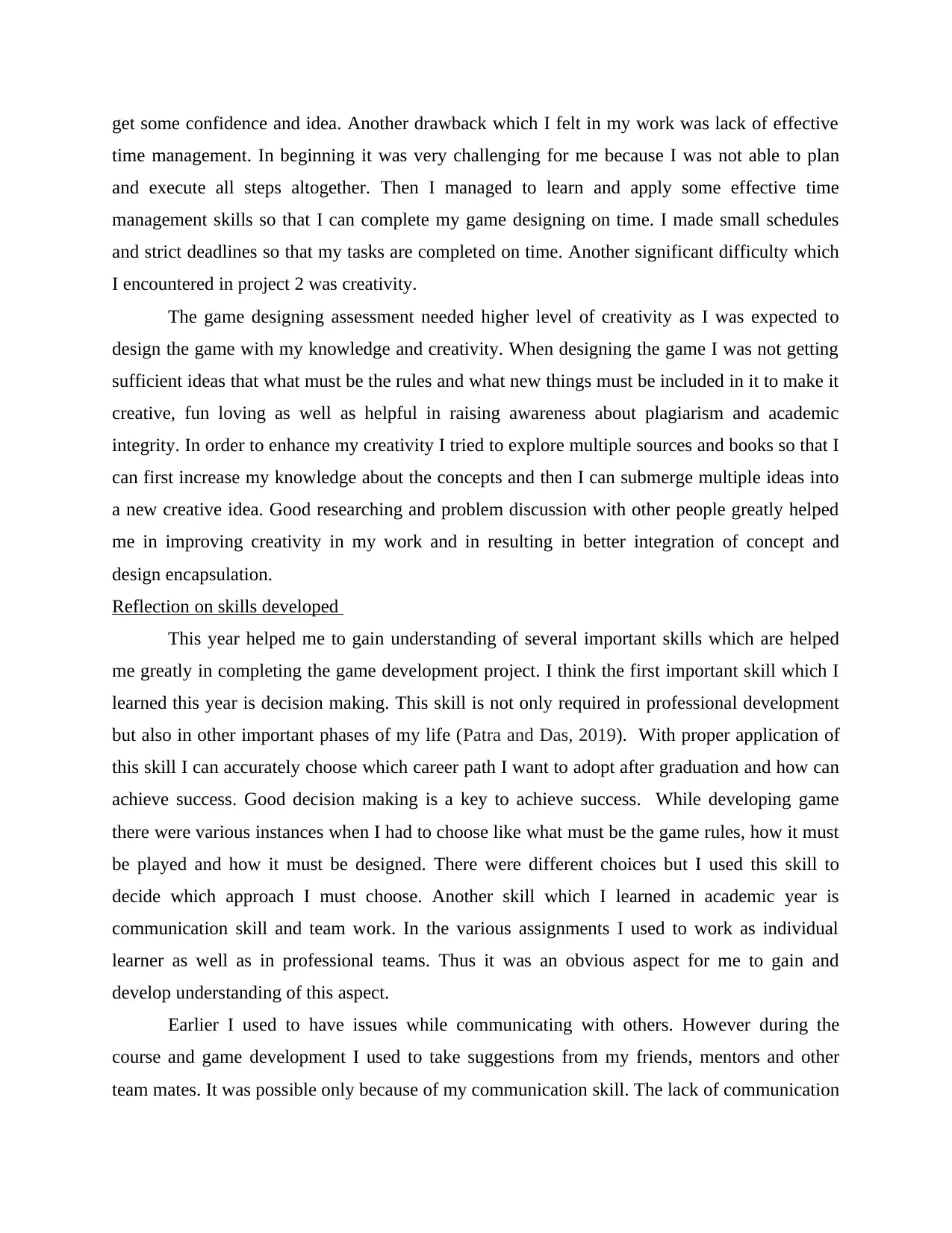
get some confidence and idea. Another drawback which I felt in my work was lack of effective
time management. In beginning it was very challenging for me because I was not able to plan
and execute all steps altogether. Then I managed to learn and apply some effective time
management skills so that I can complete my game designing on time. I made small schedules
and strict deadlines so that my tasks are completed on time. Another significant difficulty which
I encountered in project 2 was creativity.
The game designing assessment needed higher level of creativity as I was expected to
design the game with my knowledge and creativity. When designing the game I was not getting
sufficient ideas that what must be the rules and what new things must be included in it to make it
creative, fun loving as well as helpful in raising awareness about plagiarism and academic
integrity. In order to enhance my creativity I tried to explore multiple sources and books so that I
can first increase my knowledge about the concepts and then I can submerge multiple ideas into
a new creative idea. Good researching and problem discussion with other people greatly helped
me in improving creativity in my work and in resulting in better integration of concept and
design encapsulation.
Reflection on skills developed
This year helped me to gain understanding of several important skills which are helped
me greatly in completing the game development project. I think the first important skill which I
learned this year is decision making. This skill is not only required in professional development
but also in other important phases of my life (Patra and Das, 2019). With proper application of
this skill I can accurately choose which career path I want to adopt after graduation and how can
achieve success. Good decision making is a key to achieve success. While developing game
there were various instances when I had to choose like what must be the game rules, how it must
be played and how it must be designed. There were different choices but I used this skill to
decide which approach I must choose. Another skill which I learned in academic year is
communication skill and team work. In the various assignments I used to work as individual
learner as well as in professional teams. Thus it was an obvious aspect for me to gain and
develop understanding of this aspect.
Earlier I used to have issues while communicating with others. However during the
course and game development I used to take suggestions from my friends, mentors and other
team mates. It was possible only because of my communication skill. The lack of communication
time management. In beginning it was very challenging for me because I was not able to plan
and execute all steps altogether. Then I managed to learn and apply some effective time
management skills so that I can complete my game designing on time. I made small schedules
and strict deadlines so that my tasks are completed on time. Another significant difficulty which
I encountered in project 2 was creativity.
The game designing assessment needed higher level of creativity as I was expected to
design the game with my knowledge and creativity. When designing the game I was not getting
sufficient ideas that what must be the rules and what new things must be included in it to make it
creative, fun loving as well as helpful in raising awareness about plagiarism and academic
integrity. In order to enhance my creativity I tried to explore multiple sources and books so that I
can first increase my knowledge about the concepts and then I can submerge multiple ideas into
a new creative idea. Good researching and problem discussion with other people greatly helped
me in improving creativity in my work and in resulting in better integration of concept and
design encapsulation.
Reflection on skills developed
This year helped me to gain understanding of several important skills which are helped
me greatly in completing the game development project. I think the first important skill which I
learned this year is decision making. This skill is not only required in professional development
but also in other important phases of my life (Patra and Das, 2019). With proper application of
this skill I can accurately choose which career path I want to adopt after graduation and how can
achieve success. Good decision making is a key to achieve success. While developing game
there were various instances when I had to choose like what must be the game rules, how it must
be played and how it must be designed. There were different choices but I used this skill to
decide which approach I must choose. Another skill which I learned in academic year is
communication skill and team work. In the various assignments I used to work as individual
learner as well as in professional teams. Thus it was an obvious aspect for me to gain and
develop understanding of this aspect.
Earlier I used to have issues while communicating with others. However during the
course and game development I used to take suggestions from my friends, mentors and other
team mates. It was possible only because of my communication skill. The lack of communication
⊘ This is a preview!⊘
Do you want full access?
Subscribe today to unlock all pages.

Trusted by 1+ million students worldwide
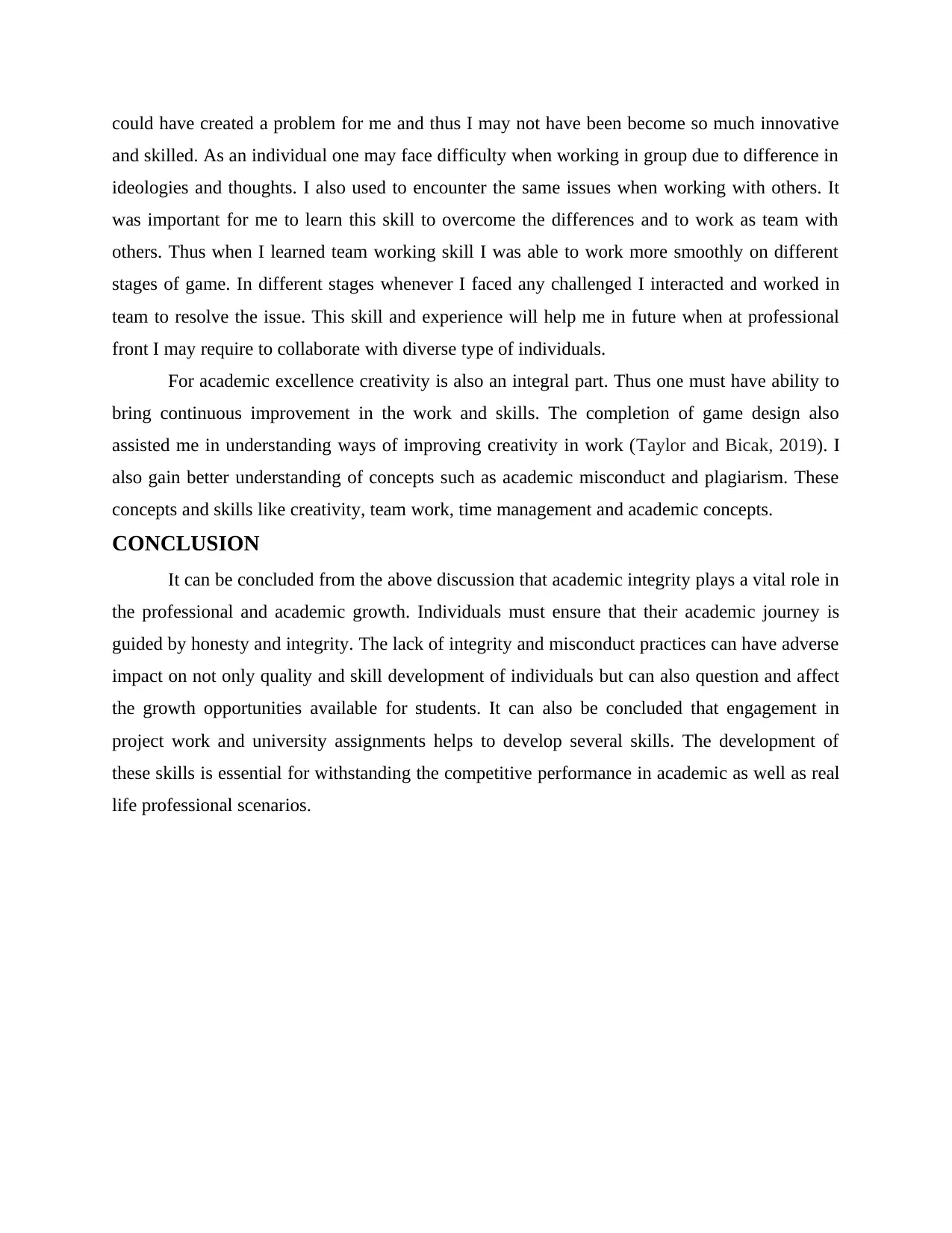
could have created a problem for me and thus I may not have been become so much innovative
and skilled. As an individual one may face difficulty when working in group due to difference in
ideologies and thoughts. I also used to encounter the same issues when working with others. It
was important for me to learn this skill to overcome the differences and to work as team with
others. Thus when I learned team working skill I was able to work more smoothly on different
stages of game. In different stages whenever I faced any challenged I interacted and worked in
team to resolve the issue. This skill and experience will help me in future when at professional
front I may require to collaborate with diverse type of individuals.
For academic excellence creativity is also an integral part. Thus one must have ability to
bring continuous improvement in the work and skills. The completion of game design also
assisted me in understanding ways of improving creativity in work (Taylor and Bicak, 2019). I
also gain better understanding of concepts such as academic misconduct and plagiarism. These
concepts and skills like creativity, team work, time management and academic concepts.
CONCLUSION
It can be concluded from the above discussion that academic integrity plays a vital role in
the professional and academic growth. Individuals must ensure that their academic journey is
guided by honesty and integrity. The lack of integrity and misconduct practices can have adverse
impact on not only quality and skill development of individuals but can also question and affect
the growth opportunities available for students. It can also be concluded that engagement in
project work and university assignments helps to develop several skills. The development of
these skills is essential for withstanding the competitive performance in academic as well as real
life professional scenarios.
and skilled. As an individual one may face difficulty when working in group due to difference in
ideologies and thoughts. I also used to encounter the same issues when working with others. It
was important for me to learn this skill to overcome the differences and to work as team with
others. Thus when I learned team working skill I was able to work more smoothly on different
stages of game. In different stages whenever I faced any challenged I interacted and worked in
team to resolve the issue. This skill and experience will help me in future when at professional
front I may require to collaborate with diverse type of individuals.
For academic excellence creativity is also an integral part. Thus one must have ability to
bring continuous improvement in the work and skills. The completion of game design also
assisted me in understanding ways of improving creativity in work (Taylor and Bicak, 2019). I
also gain better understanding of concepts such as academic misconduct and plagiarism. These
concepts and skills like creativity, team work, time management and academic concepts.
CONCLUSION
It can be concluded from the above discussion that academic integrity plays a vital role in
the professional and academic growth. Individuals must ensure that their academic journey is
guided by honesty and integrity. The lack of integrity and misconduct practices can have adverse
impact on not only quality and skill development of individuals but can also question and affect
the growth opportunities available for students. It can also be concluded that engagement in
project work and university assignments helps to develop several skills. The development of
these skills is essential for withstanding the competitive performance in academic as well as real
life professional scenarios.
Paraphrase This Document
Need a fresh take? Get an instant paraphrase of this document with our AI Paraphraser
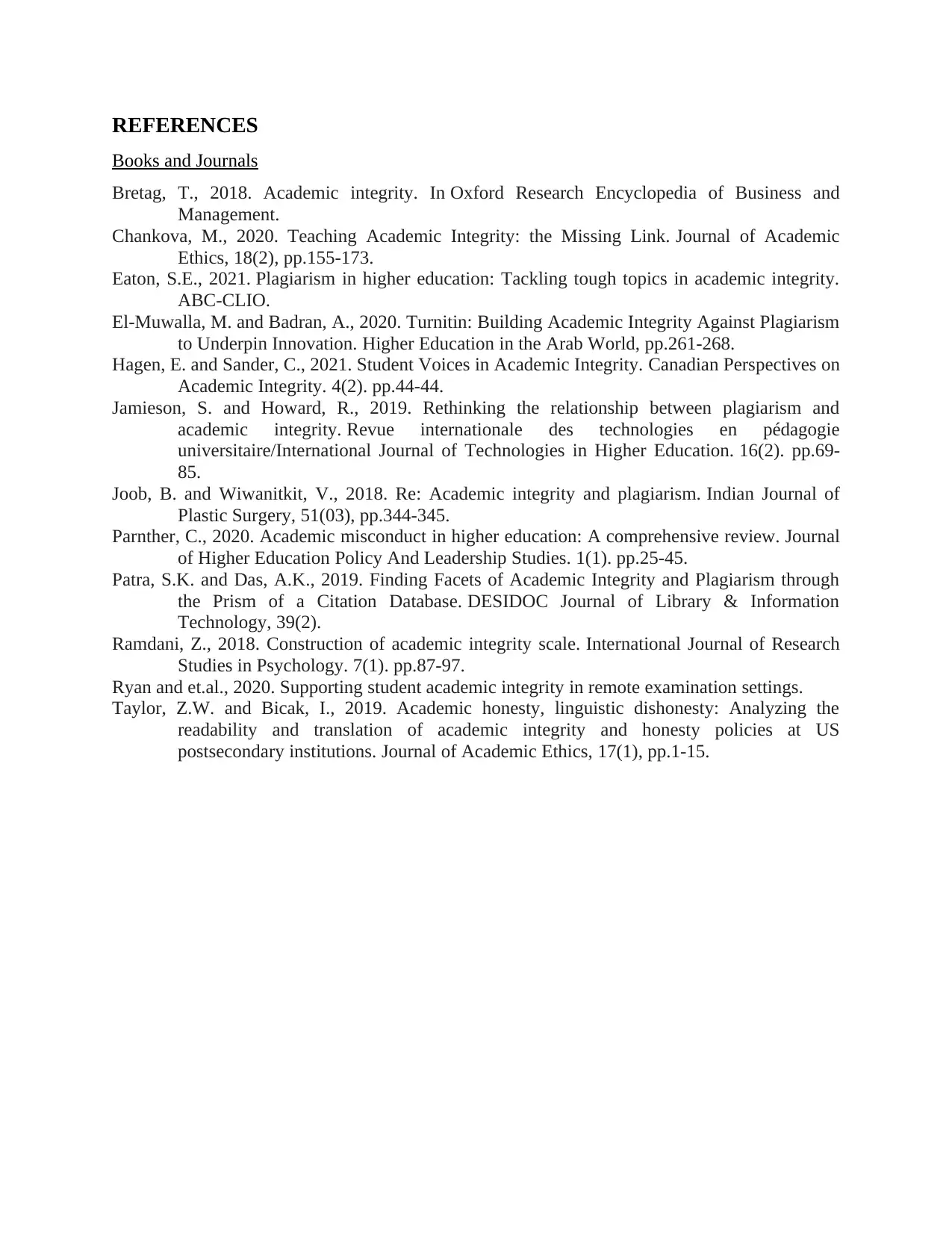
REFERENCES
Books and Journals
Bretag, T., 2018. Academic integrity. In Oxford Research Encyclopedia of Business and
Management.
Chankova, M., 2020. Teaching Academic Integrity: the Missing Link. Journal of Academic
Ethics, 18(2), pp.155-173.
Eaton, S.E., 2021. Plagiarism in higher education: Tackling tough topics in academic integrity.
ABC-CLIO.
El-Muwalla, M. and Badran, A., 2020. Turnitin: Building Academic Integrity Against Plagiarism
to Underpin Innovation. Higher Education in the Arab World, pp.261-268.
Hagen, E. and Sander, C., 2021. Student Voices in Academic Integrity. Canadian Perspectives on
Academic Integrity. 4(2). pp.44-44.
Jamieson, S. and Howard, R., 2019. Rethinking the relationship between plagiarism and
academic integrity. Revue internationale des technologies en pédagogie
universitaire/International Journal of Technologies in Higher Education. 16(2). pp.69-
85.
Joob, B. and Wiwanitkit, V., 2018. Re: Academic integrity and plagiarism. Indian Journal of
Plastic Surgery, 51(03), pp.344-345.
Parnther, C., 2020. Academic misconduct in higher education: A comprehensive review. Journal
of Higher Education Policy And Leadership Studies. 1(1). pp.25-45.
Patra, S.K. and Das, A.K., 2019. Finding Facets of Academic Integrity and Plagiarism through
the Prism of a Citation Database. DESIDOC Journal of Library & Information
Technology, 39(2).
Ramdani, Z., 2018. Construction of academic integrity scale. International Journal of Research
Studies in Psychology. 7(1). pp.87-97.
Ryan and et.al., 2020. Supporting student academic integrity in remote examination settings.
Taylor, Z.W. and Bicak, I., 2019. Academic honesty, linguistic dishonesty: Analyzing the
readability and translation of academic integrity and honesty policies at US
postsecondary institutions. Journal of Academic Ethics, 17(1), pp.1-15.
Books and Journals
Bretag, T., 2018. Academic integrity. In Oxford Research Encyclopedia of Business and
Management.
Chankova, M., 2020. Teaching Academic Integrity: the Missing Link. Journal of Academic
Ethics, 18(2), pp.155-173.
Eaton, S.E., 2021. Plagiarism in higher education: Tackling tough topics in academic integrity.
ABC-CLIO.
El-Muwalla, M. and Badran, A., 2020. Turnitin: Building Academic Integrity Against Plagiarism
to Underpin Innovation. Higher Education in the Arab World, pp.261-268.
Hagen, E. and Sander, C., 2021. Student Voices in Academic Integrity. Canadian Perspectives on
Academic Integrity. 4(2). pp.44-44.
Jamieson, S. and Howard, R., 2019. Rethinking the relationship between plagiarism and
academic integrity. Revue internationale des technologies en pédagogie
universitaire/International Journal of Technologies in Higher Education. 16(2). pp.69-
85.
Joob, B. and Wiwanitkit, V., 2018. Re: Academic integrity and plagiarism. Indian Journal of
Plastic Surgery, 51(03), pp.344-345.
Parnther, C., 2020. Academic misconduct in higher education: A comprehensive review. Journal
of Higher Education Policy And Leadership Studies. 1(1). pp.25-45.
Patra, S.K. and Das, A.K., 2019. Finding Facets of Academic Integrity and Plagiarism through
the Prism of a Citation Database. DESIDOC Journal of Library & Information
Technology, 39(2).
Ramdani, Z., 2018. Construction of academic integrity scale. International Journal of Research
Studies in Psychology. 7(1). pp.87-97.
Ryan and et.al., 2020. Supporting student academic integrity in remote examination settings.
Taylor, Z.W. and Bicak, I., 2019. Academic honesty, linguistic dishonesty: Analyzing the
readability and translation of academic integrity and honesty policies at US
postsecondary institutions. Journal of Academic Ethics, 17(1), pp.1-15.
1 out of 8
Related Documents
Your All-in-One AI-Powered Toolkit for Academic Success.
+13062052269
info@desklib.com
Available 24*7 on WhatsApp / Email
![[object Object]](/_next/static/media/star-bottom.7253800d.svg)
Unlock your academic potential
Copyright © 2020–2026 A2Z Services. All Rights Reserved. Developed and managed by ZUCOL.


